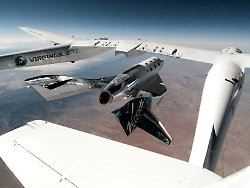Saturday May 22, 2021
“VSS Unity” reaches space
Virgin Galactic brings people into space
Compared to competition from SpaceX and on its own schedule, Virgin Galactic is lagging behind. After several setbacks, the private space provider has now succeeded in making the first manned flight of the “VSS Unity” capsule into space.
The “VSS Unity” space aircraft operated by Virgin Galactic has completed a manned space test flight. The capsule, manned by two pilots, was launched on board a carrier aircraft from the commercial spaceport Spaceport America in the US state of New Mexico. The mother ship dropped off the “VSS Unity” at a height of almost 14 kilometers.
Then the space capsule accelerated with its own rocket engine and continued the flight. “Now in space,” wrote Virgin Galactic on Twitter during the event, before the spaceplane returned to Earth and landed safely at the spaceport.
The British billionaire Richard Branson, who wants to offer commercial space flights with his company Virgin Galactic, followed the test flight on site. During a test flight last December, the rocket engine did not work as planned. “VSS Unity” landed right back on earth after separating from the mother ship, without having first reached space.
Branson’s private space program suffered the worst setback in November 2014 when the previous model “SpaceShipTwo” crashed on a test flight over California and a pilot was killed in the process. Too early use of the descent program was identified as a possible cause of the crash.
Bransons had originally planned to bring paying space tourists into space as early as 2020. Several years ago, the entrepreneur reported on hundreds of interested customers. The competition is now way ahead of Virgin Galactic. Tesla boss Elon Musk’s SpaceX company has already brought astronauts to the International Space Station on behalf of NASA. The space company of Amazon founder Jeff Bezos, Blue Origin, wants to bring tourists into space for the first time in July. The start is planned for July 20th. The “New Shepard” rocket, however, has never been tested with people on board.
.
